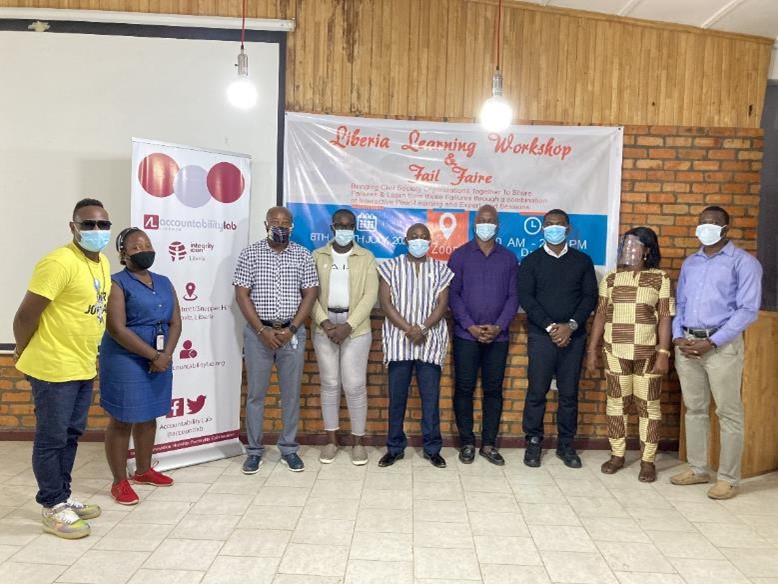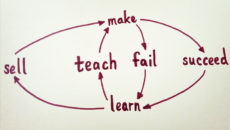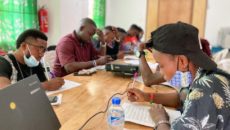The following piece was sponsored by Accountability Lab.
“How can we help each other improve?” was the big question we wanted to answer. To do so, Accountability Lab Liberia, in partnership with Kids Educational Engagement Project and with support from the West African Civil Society Institute, recently hosted a two-day learning workshop and Fail Faire to support civil society organizations to learn and bolster coordination and collaboration between each other. The virtual learning event brought together over a total of 37 organizations to reflect, learn and plan on the role CSOs can play to improve Liberia’s social accountability landscape. The sessions were held at Accountability Lab’s office at iCampus on Carey Street and facilitated by the Accountability Lab’s and KEEP Liberia’s teams.
An organization or an ecosystem cannot grow without pausing, reflecting, and learning from past mistakes and failures. But this is often overlooked by even well-established organizations that simultaneously manage multiple priorities – fundraising, project delivery, reporting. The first part of this session focused on why it is important to pause and reflect and how organizations can learn from failures. We wanted to take stock of how CSOs have adapted and progressed over time. Some key insights from the discussions included:
The first step is to admit mistakes have been made. When implementing a range of projects, organizations gather a lot of information and data to tell stories. But often, failures are not captured, and donor reports are filled with success stories. It is equally important to talk about failures. Learning cannot begin without pausing and reflecting on what has not worked, as this can foster adaptive learning, which is very important when looking for solutions for complex accountability challenges in places like Liberia (as we have pointed out previously here). Going forwards, the group agreed that honest, open feedback or failure-type fairs would be useful to move beyond any stigma associated with mistakes.
Data and information are not just for donor reports. Even well-established organizations that use best practices for monitoring, evaluation, and learning (such as baseline, midline, and endline surveys) do not always use the data and information gathered to inform future work. Organizations may end up making the same mistakes over and over if they do not reflect, learn, and adapt. Every kind of data- whether it is programmatic or organizational- should not be used only for reporting purposes. It is equally important that reflection and learning are ingrained in every part of the organization and not limited to the monitoring, evaluation, and learning team. We know from previous experience that Liberian CSOs can use information in creative ways to support learning.
CSOs across Liberia face similar organizational and programmatic challenges. The challenges and failures shared by participating CSOs around project management, logistical, human resources, fundraising, sustainability, policy changes, and partnerships seemed to resonate well among all the participating CSOs. This shows not only the importance of reflecting, sharing, and learning from each other broadly – but also the ways we might be able to create topic-specific learning communities. One idea we would like to pursue, for example, is to create thematic WhatsApp groups among team members across CSOs working on these issues through which we can share resources and ideas. We know that the improvement of the ecosystem as a whole is best for all of us.
Lack of adaptive learning and collaborative efforts are impeding the development of the entire civil society ecosystem. Related to the previous point, adaptive learning and sharing are important for improving organizational and programmatic outcomes and improving the entire civil society ecosystem – so the same mistakes are not repeated by others working in the same space. Unless organizations work together to share what they have learned, there is a likelihood of duplication of efforts as well as failures. This is not only a waste of time and resources but also undermines the collective good. We developed an idea for iCampus – as a shared collaboration space – to host a series of broader discussions about civic space and CSO challenges and opportunities over the coming months.
Based on the above insights, organizations within this community can prioritize understanding major issues and challenges, keep track of what is working and what is not, and help each other adapt to changing contexts and priorities. For instance, if an organization like Leemah fails to reflect and recognize the right stakeholders or policy areas to focus on, then it can never deliver for the girls it hopes to support.
The COVID-19 pandemic has been a major challenge for many organizations, and it has also taught us the importance of adapting to changing circumstances. For instance, some organizations quickly moved to virtual platforms and continued to engage with their key stakeholders (such as this learning workshop). Failure to reflect and make the necessary changes would have meant reducing the scope of work or shutting down initiatives completely. No matter the circumstances or how it is done, pausing, reflecting, and learning should underpin any organization’s approach to creating change.
Authored by Parnneh Mallobe, Communications Lead, Accountability Lab Liberia; and Marsin Tarpeh, Founder, Molding Minds and Changing Attitudes
Featured photo by Bernard Goldbach



